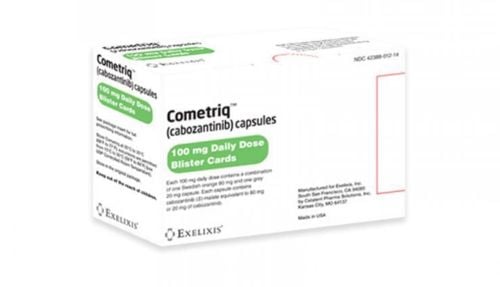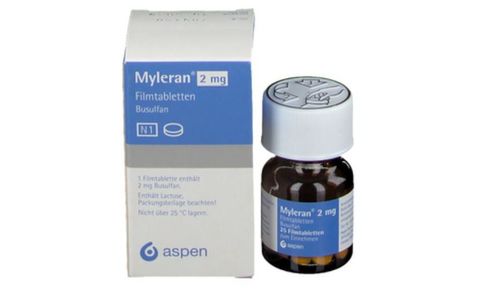This is an automatically translated article.
Unitrexates are often prescribed by doctors to treat cancers. During the course of using Unitrexates, you need to pay attention to strictly follow all the recommendations of your doctor to effectively reverse the disease.
1. What is Unitrexates?
Unitrexates belongs to the group of anti-cancer drugs and acts on the body's immune system. Currently, the drug Unitrexates is used mainly in the treatment of diseases such as psoriasis, cancer of the locus or rheumatoid arthritis, ... The drug contains the main active ingredient is Methotrexate 2.5mg - a drug. It has anti-cancer and immunosuppressive effects.In addition, each Unitrexates tablet has a combination of other auxiliary ingredients to help stabilize the drug, increase pharmacokinetics and pharmacodynamics, including:
Corn starch. Starch Sodium Glycolate. Lactose monohydrate. Hydroxypropyl cellulose. Sodium lauryl sulfate. Povidon. Magnesium stearate. Yellow number 4 (Tartrazine).
2. What are the effects of Unitrexates?
The main active ingredient Methotrexate is known to be an anti-cancer agent, with a stronger affinity for Dihydrofolate reductase enzyme than endogenous folic acid. This helps Methotrexate inhibit the conversion of folic acid to tetrahydrofolic acid, thereby stopping DNA synthesis. In addition, Methotrexate has the ability to inhibit the proliferation of tissues such as skin epithelium, oral epithelium, fetal cells, bone marrow, rapidly dividing malignant cells and intestinal mucosa. In addition, the active ingredient methotrexate in Unitrexates also has the effect of suppressing the immune system and providing effective anti-inflammatory effects. Therefore, Methotrexate is often used to treat rheumatoid arthritis. On the other hand, this active ingredient is also known for its ability to prevent the rejection reaction after the patient undergoes bone marrow transplant surgery.Unitrexates drug is often prescribed by doctors to treat the following cases:
Cancer of the trophobium (Egg pregnancy, choroidal adenoma or uterine cancer). Breast cancer. Leukemia disease. Bladder cancer. Lung cancer. Head and neck cancer. Bone, cartilage, or fibrous sarcomas. Psoriatic arthritis. Psoriasis disease. Rheumatoid arthritis. Non-Hodgkin Lymphoma. T-cell lymphoma (mycosis fungoides). Do not use Unitrexates in the following cases without consulting your doctor:
Patients who are hypersensitive or allergic to Methotrexate or any other active ingredient in the drug. People with malnutrition, severe kidney failure, severe kidney or liver dysfunction. The patient has a weakened immune system. Persons with preexisting hematopoietic disorders, such as bone marrow hypoplasia. People who are suffering from leukopenia, thrombocytopenia or severe clinical anemia. People with hepatitis, cirrhosis and heavy drinking. People with severe, acute or chronic infections, such as HIV infection and tuberculosis. Patients with peptic ulcers or mouth ulcers. People receiving live vaccines. Pregnant. Breastfeeding mothers.
3. Dosage and how to use Unitrexates effectively
Dosage of Unitrexates drug
Here is the dose of Unitrexates drug recommended by the doctor for each specific disease case:
Leukemia treatment: Use Methotrexate dose 3.3mg / m2 (square meter of area). body)/day with Prednisone 60mg/m2/day for 4-6 weeks. Thereafter, a maintenance dose was administered orally or intramuscularly at a dose of Methotrexate 30mg/m2 (twice a week) or intravenously at a dose of 2.5mg/kg body weight every 14 days. Treatment of pancreatic cancer: Use dose from 10-30mg / day, treatment within 5 days. The course of treatment may be repeated after an interval of 7-12 days when the symptoms of toxicity have disappeared. Treatment of rheumatoid arthritis: Use a dose of 7.5 - 20mg / time / week or equally divided doses into 3 times, each time 12 hours apart. Treatment of psoriasis: Use a dose of 7.5 - 20mg / time / week or divide the dose into 3 times, each time about 12 hours apart. Unitrexates drug instructions
Unitrexates medicine is in the form of tablets, so patients need to take the drug orally according to the dosage recommended by the doctor. When taking Unitrexates, you should swallow the tablet whole, avoid crushing, chewing or taking with other liquids such as carbonated water, soft drinks, alcoholic beverages or coffee.
Before starting treatment with Unitrexates, patients should also carefully read the instructions for use on the product packaging or follow the advice of their doctor. You absolutely should not use, adjust the dose or stop taking Unitrexates without consulting your doctor.
Treatment of Unitrexates overdose
When overdosing Unitrexates, patients may experience ulceration of the oral mucosa. To manage this Methotrexate overdose symptom, your doctor may recommend that you start taking Leucovorin calcium as soon as possible.
If serious overdose reactions occur, the doctor will conduct the simultaneous application of supportive measures such as alkalinization of the urine, rehydration and electrolyte replacement.
4. What side effects does Unitrexates cause?
Below are the side effects that patients are at risk of experiencing during treatment with Unitrexates:
Common side effects: Dizziness, headache, skin edema, hair loss, digestive disorders, increased liver enzymes, nausea, diarrhea, stomatitis, anorexia, ... Uncommon side effects: Thrombocytopenia, leukopenia, itching, pulmonary fibrosis, pneumonia, nosebleeds, vaginal ulcers. Rare side effects: Depression, confusion, impotence and decreased sex drive. If you experience any unusual symptoms while using Unitrexates, you should notify your doctor as soon as possible for treatment.
5. What should be noted when using Unitrexates?
When being treated with Unitrexates, patients should note and be cautious of the following:
Avoid using other drugs with similar properties to Methotrexate. Renal and liver function should be checked before treatment with Unitrexates to guide appropriate dose adjustment for the patient. Closely monitor lung function during drug use, as lung damage can occur at any time. Unitrexates has the ability to suppress immunity, so it can reduce the ability to respond to vaccines, especially live vaccines (easily causing dangerous antigenic responses to patients). Use caution when using Unitrexates for people who are bleeding. If bleeding increases, the patient should stop taking the drug and promptly initiate a blood transfusion or hemostasis. Use caution when using Unitrexates in children and people planning to become pregnant. Unitrexates can cause dizziness and fatigue as side effects, so caution should be exercised when administering the drug to patients who drive or operate machinery. The active ingredient Methotrexate in the drug has a teratogenic risk, so it should not be used for pregnant women. Methotrexate is excreted in breast milk and affects the health of the infant. Ideally, nursing mothers should avoid taking the drug during this period. Store Unitrexates in a cool, dry place and at a temperature below 30 degrees Celsius, especially avoid storing it in an area with direct sunlight.
6. What drugs interact with Unitrexates?
Below is a list of drugs that may interact with Unitrexates:
Increased toxicity and accumulation of Methotrexate when co-administered with drugs such as Phenytoin, Salicylate, Co-trimoxazol, Chloramphenicol or Tetracycline,... Inhibits renal excretion of Methotrexate when used in combination with non-steroidal anti-inflammatory drugs. An interaction occurs if methotrexate is used together with antibiotics of the penicillin group. The effectiveness of Unitrexates is significantly reduced when taken with preparations containing vitamins and folic acid. Increased hepatotoxicity when Unitrexates is co-administered with Azathioprine, Retinoid and Sulfasalazine. Decreased clearance of theophylline when administered concomitantly with Unitrexates.













